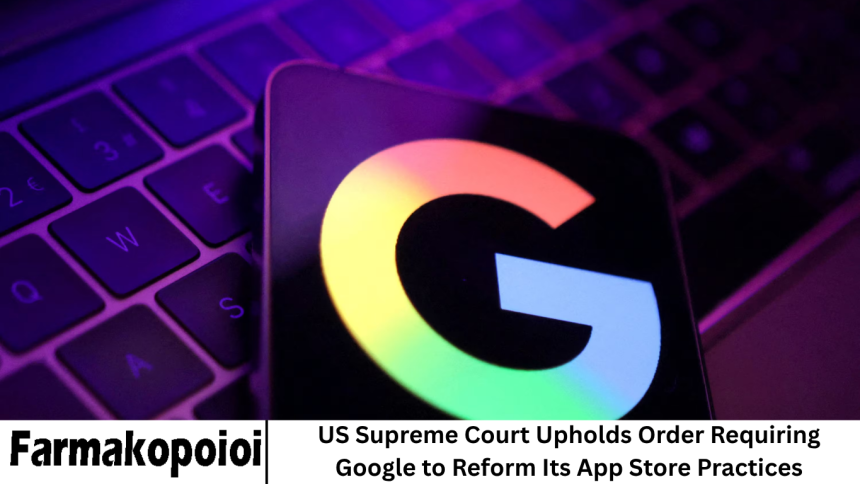In a decision with far-reaching implications for the digital economy, the United States Supreme Court has upheld a lower court’s ruling requiring Google to make sweeping reforms to its Google Play Store operations. The ruling marks a historic moment in the ongoing battle between regulators, developers, and technology giants.
- The Background: How the Case Against Google Began
- Key Aspects of the Supreme Court’s Decision
- Allowing Third-Party App Stores:
- Alternative Billing Options:
- Prohibition on Exclusive Deals:
- Transparency Requirements:
- Developer Communication Rights:
- Google’s Response: Concerns Over Security and Ecosystem Integrity
- The Broader Context: A Turning Point for Tech Antitrust Enforcement
- Developers and Industry Reactions
- Economic Implications: Billions at Stake
- Consumer Impact: More Choice, More Responsibility
- Legal Experts Weigh In: What Comes Next
- Comparisons with Apple’s App Store Case
- Global Ripple Effects: Beyond U.S. Borders
- Future of the App Economy: Innovation or Fragmentation?
- Frequently Asked Question
- Conclusion
By allowing the order to stand, the Supreme Court has effectively endorsed a set of remedies aimed at curbing the company’s market power — potentially transforming how millions of Android apps are distributed and monetized globally.
This case, closely watched by developers, lawmakers, and rival tech firms, could redefine the balance of power in the digital app marketplace and set a new precedent for how antitrust laws apply to modern tech platforms.
More Read: Ex-Milwaukee Hotel Workers in D’Vontaye Mitchell Case Avoid Lengthy Prison Sentences
The Background: How the Case Against Google Began
The legal dispute that culminated in this Supreme Court decision traces back to Epic Games v. Google, a high-profile antitrust lawsuit filed in 2020. Epic Games, the creator of Fortnite, accused Google of maintaining an unlawful monopoly over Android app distribution through restrictive policies on the Google Play Store.
Epic argued that Google’s mandatory use of its billing system — which charges commissions of up to 30% on in-app purchases — constituted an abuse of market power. The company claimed that Google coerced developers into accepting unfavorable terms and blocked competing app stores from gaining traction on Android devices.
A federal jury sided with Epic in December 2023, concluding that Google’s app store practices violated antitrust laws. The court subsequently ordered a series of reforms to promote fair competition, transparency, and developer freedom.
Google appealed the ruling, but the Supreme Court’s refusal to intervene now ensures that these reforms will proceed.
Key Aspects of the Supreme Court’s Decision
By declining to hear Google’s appeal, the Supreme Court effectively upheld the lower court’s injunction requiring the company to implement major changes to its app store operations. The reforms include:
Allowing Third-Party App Stores:
Google must now permit Android users to download and install apps through third-party marketplaces without unnecessary barriers or warnings that discourage sideloading.
Alternative Billing Options:
Developers will have the right to offer alternative payment methods for in-app purchases, bypassing Google’s mandatory billing system and its associated fees.
Prohibition on Exclusive Deals:
Google can no longer enter into secretive agreements with device manufacturers or major developers that restrict competition or prioritize its store over others.
Transparency Requirements:
The company must clearly disclose how app ranking, recommendation, and review systems operate to prevent manipulation and favoritism.
Developer Communication Rights:
Developers can now inform users about alternative pricing or payment options outside the Play Store, a practice previously restricted by Google’s policies.
These measures aim to level the playing field between large tech companies and smaller app developers, ensuring consumers have more choice and access to competitive pricing.
Google’s Response: Concerns Over Security and Ecosystem Integrity
In a statement following the Supreme Court’s decision, Google expressed disappointment, arguing that the reforms could undermine the security and reliability of the Android ecosystem.
“We are deeply concerned that these changes could compromise user safety, weaken the Android experience, and increase the risk of fraud,” a Google spokesperson said. “We’ve always believed that our model supports both innovation and choice while keeping users secure.”
Google maintains that its app store policies exist not merely for profit but to ensure consistent user experiences and data protection. The company insists that sideloading apps and enabling external billing systems could open the door to malware, phishing attacks, and privacy violations.
Despite these concerns, legal experts note that Google’s arguments echo those previously made by Apple during its own antitrust battles — arguments that courts and regulators have increasingly scrutinized as potentially overstated.
The Broader Context: A Turning Point for Tech Antitrust Enforcement
The Supreme Court’s decision is more than just a rebuke to Google; it’s a milestone in global efforts to rein in the power of Big Tech. Over the past decade, regulators worldwide have launched a series of investigations and lawsuits targeting the monopolistic behavior of major digital platforms.
In the United States, both the Department of Justice (DOJ) and the Federal Trade Commission (FTC) have intensified their focus on technology giants like Apple, Amazon, Meta, and Microsoft, accusing them of using market dominance to crush competition.
The Google Play Store case represents one of the first instances in which a court has imposed concrete behavioral remedies on a major tech company in the app distribution sector. This outcome may embolden regulators and private litigants to pursue similar cases against other firms.
Globally, the ruling aligns with efforts such as the European Union’s Digital Markets Act (DMA), which mandates similar reforms requiring dominant platforms to allow alternative app stores, enable third-party billing, and prevent self-preferencing.
Developers and Industry Reactions
The Supreme Court’s move has been met with enthusiasm across much of the developer community, many of whom have long criticized Google’s commission structure and restrictive policies.
Tim Sweeney, CEO of Epic Games, hailed the decision as “a victory for developers and consumers everywhere.” In a post on X (formerly Twitter), he wrote:
“The Supreme Court’s decision confirms what we’ve always known: fair competition and open platforms drive innovation. Developers will finally be free to choose how to reach users without being forced to hand over 30% of their revenue.”
Spotify, Match Group, and ProtonMail — all of which have previously clashed with Google over in-app purchase policies — described the decision as a necessary correction to years of digital exploitation.
Consumer advocacy groups have also welcomed the ruling, suggesting it could lead to lower app prices and greater innovation. “When one company controls access to millions of users, it can dictate unfair terms,” said Consumer Watchdog in a statement. “This decision restores balance and accountability.”
Economic Implications: Billions at Stake
The financial implications of this ruling for Google are enormous. The Play Store generated over $48 billion in revenue in 2024, largely driven by in-app purchases and subscriptions. The mandatory commission fees have been one of Google’s most lucrative income streams, helping fund its broader ecosystem and advertising ventures.
Analysts estimate that the court-mandated reforms could reduce Play Store revenue by 20–30% annually, depending on how many developers and users adopt alternative billing methods. Some developers may still choose Google’s system for convenience, but many will likely opt for cheaper alternatives that maximize their earnings.
However, the economic impact extends beyond Google. Rival app stores, such as Samsung Galaxy Store, Amazon Appstore, and emerging third-party marketplaces, may now find fertile ground to grow.
This increased competition could reshape Android’s commercial landscape and challenge Apple’s similar App Store model, which remains under regulatory scrutiny in the U.S. and Europe.
Consumer Impact: More Choice, More Responsibility
For Android users, the ruling could bring both greater freedom and new challenges. On one hand, consumers will gain access to a wider array of apps, better pricing, and more flexible payment options.
Developers might introduce special discounts or exclusive features outside of Google Play, leading to more diverse app ecosystems. On the other hand, experts warn that increased openness may also expose users to security risks.
Sideloading apps — downloading software from outside the Play Store — has historically been associated with higher risks of malware or data theft. To mitigate this, the court’s order allows Google to maintain reasonable security protocols.
Such as app verification systems and malware scanning, as long as they do not unfairly restrict competition. The company will likely introduce enhanced transparency mechanisms to educate users about safe installation practices.
Legal Experts Weigh In: What Comes Next
Legal scholars view this decision as a watershed moment for antitrust enforcement in the digital age. According to Professor Lina Hartwell, an antitrust expert at Columbia Law School, the case underscores the judiciary’s willingness to adapt traditional monopoly law to 21st-century business models.
“This ruling reaffirms that digital markets are not exempt from the principles of fair competition,” Hartwell explained. “Tech companies can no longer claim that innovation justifies anti-competitive behavior.”
Some analysts predict that Google may pursue further legislative or regulatory relief, arguing that overly aggressive reforms could harm the Android ecosystem’s long-term sustainability. However, given the Supreme Court’s stance, the company’s legal avenues are now largely exhausted.
In the months ahead, Google is expected to work closely with regulators and independent monitors to implement the required reforms. Compliance deadlines could extend into 2026, depending on technical and logistical challenges.
Comparisons with Apple’s App Store Case
The parallels between Google’s case and Apple’s ongoing legal struggles are striking. Apple has faced similar accusations of monopolistic practices in its App Store, particularly after its 2021 confrontation with Epic Games.
While Apple managed to avoid a complete overhaul, it was ordered to allow developers to direct users to alternative payment methods — a ruling that remains partially under appeal. Unlike Apple, however, Google’s position was weaker because Android is an open-source platform.
The courts found that Google’s restrictive practices contradicted its public claims of openness and fairness. Consequently, the remedies imposed on Google are broader and more stringent than those on Apple.
This contrast could pressure Apple to voluntarily expand its compliance in order to avoid future litigation or align with evolving regulatory expectations worldwide.
Global Ripple Effects: Beyond U.S. Borders
The Supreme Court’s decision is already reverberating across global markets. Regulators in the European Union, South Korea, India, and Japan have cited the U.S. ruling as a potential model for their own antitrust enforcement strategies.
- In South Korea, legislation already requires app store operators to allow third-party billing systems — a move that set an early precedent.
- In the EU, the Digital Markets Act (DMA) enforces similar obligations for “gatekeepers,” with fines reaching up to 10% of global revenue for non-compliance.
- In India, the Competition Commission has been investigating Google’s Android dominance since 2018 and recently ordered partial remedies similar to those upheld in the U.S.
The growing international consensus suggests that the era of unregulated app store monopolies is coming to an end.
Future of the App Economy: Innovation or Fragmentation?
While the ruling promises greater competition, it also introduces potential uncertainty. Analysts warn that a fragmented app ecosystem could confuse consumers and complicate software maintenance.
Developers may need to optimize apps for multiple distribution channels, increasing costs and testing requirements. However, proponents argue that this competition will spur innovation and diversity, much like how open web standards revolutionized online commerce two decades ago.
By lowering entry barriers, smaller startups and independent developers could challenge established players and introduce fresh ideas into the market. “The app economy is entering its next phase — one defined by freedom and fairness,” said Caroline Zhao, a technology policy analyst at the Brookings Institution.
“We may see a short-term adjustment period, but in the long run, users and creators alike will benefit.”
Frequently Asked Question
What exactly did the Supreme Court decide regarding Google?
The U.S. Supreme Court declined to hear Google’s appeal, effectively upholding a lower court ruling that found the company’s Play Store practices anti-competitive. This means Google must now implement reforms that allow third-party app stores, alternative billing options, and greater transparency.
How will this affect app developers?
Developers will gain more flexibility to choose how they distribute apps and process payments. They can bypass Google’s 30% commission fees by using independent billing systems and can communicate directly with users about alternative pricing or downloads.
What does this mean for Android users?
Android users will have more choices when downloading apps and making in-app purchases. However, they will also need to be more vigilant about app security, as third-party app stores and billing systems could introduce new risks if not properly regulated.
Will app prices decrease as a result of this ruling?
Likely yes. Increased competition and the removal of mandatory commissions should enable developers to offer lower prices or special discounts. However, pricing changes will vary depending on the developer and region.
How does this compare to Apple’s App Store case?
While both Apple and Google faced similar antitrust claims, the remedies against Google are more extensive. Unlike Apple’s partially upheld appeal, Google must implement structural reforms allowing true competition in Android app distribution and payments.
Could Google still challenge the ruling in the future?
Google’s legal options are now extremely limited. The Supreme Court’s decision effectively ends the appeal process. The company’s focus will now shift to compliance and negotiation with regulators over implementation timelines.
What long-term impact could this have on the tech industry?
The ruling sets a powerful precedent for future antitrust cases. It could lead to more open digital ecosystems, inspire similar reforms globally, and signal the end of monopolistic app store practices. Over time, it may foster a more diverse and innovative app economy.
Conclusion
The Supreme Court’s decision to uphold the order requiring Google to reform its app store practices represents a monumental victory for competition, transparency, and consumer choice. It sends a clear message to Silicon Valley and beyond: even the most powerful tech companies are subject to the rule of law.
While the path ahead may be complex, the precedent set by this case is likely to guide future policy and litigation across the digital economy. For developers, it’s a long-awaited opportunity to reclaim autonomy; for consumers, it’s a step toward fairer prices and more open innovation.
The reforms mandated by the court will not only reshape how Google operates but may also redefine the broader relationship between technology platforms, creators, and users in the 21st century.



















